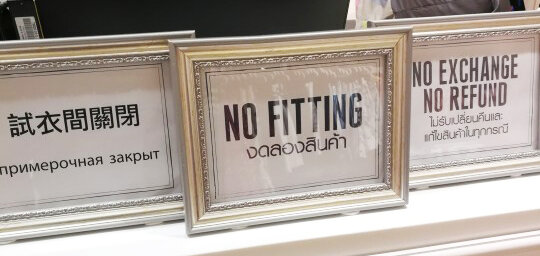A non-human-centric retail experience
January, 2020
A while ago, I was shopping in Bangkok. In one shop, there was a framed sign on the counter notifying customers that fitting clothes was not allowed. The fitting rooms were not under renovation, and this was not an unfortunate short-term inconvenience. The 2 store employees explained this was the policy during sales, but could not give an explanation of the reason behind said policy. For the time being, the 4 non-available fitting rooms were barricaded with a clothing rack.
The 2 store employees had to face multiple angry customers during the roughly 30 minutes I was in the store, who all shouted and argued angrily that this policy was ridiculous. The store was large, not very busy, and I found out later the brand has 20+ stores in multiple countries, making this experience all the more surprising.
“In strong organisations, people will break the rules because it is the right thing to do for others.” - Simon Sinek, ‘Leaders Eat Last’
But this was not a strong culture - the 2 staff in this store did not feel empowered to ignore the policy, to serve customers better, and allow them to use the fitting rooms. Perhaps in fear of being scolded, or worse, losing their jobs. As a result, their mental and emotional well-being was hurt, sales are hurt, and the business is hurt.
Bad experiences equal bad business. For small businesses, this is an absolute no-brainer, but somehow large businesses lose touch with the people who through their stores, and they start making the wrong decisions. How could this policy have been implemented without anyone raising a red flag? Following any of these 5 simple principles would have avoided it:
🗽 Authority to frontline: empower frontline staff to make decisions when they believe it will benefit the business or create value. Going through layers of hierarchies is inefficient, and will have the same reality-distorting effects as a game of Chinese whispers.
💛 Values over rules: train staff with guiding principles, brand values, and universal truths to guide behavior, to which they can give their own spin. Following rules and SOPs creates restrictions, builds a passive attitude, and inhibits innovation.
😍 Deliver customer value: staff does not work for their boss, and they do not work for the boss's boss. They work for customers, and anyone should be empowered to make decisions that result in value for customers and an improved experience.
🤝 Build a trusting culture: create an environment in which staff can give feedback to higher-ups without repercussions. Too few managers ask their employees for honest feedback, and when they do, the system is unlikely to be one in which they can voice their true opinions. 💬 Test before implementation: before implementing policies, products, or services, try them out to see whether they work, talk to people, invite feedback, and learn from suggested improvements.
🌟 Chief Experience Officer: at management level create a position for someone who owns the customer experience. Someone who is able to raise a red flag before situations like the one above arise, and someone who is able to imagine ways to conceptualize and implement services that people will love.
If you want to chat about designing human-centered customer experiences, we’re here to help. Do drop us a message.




